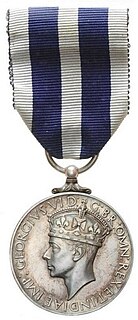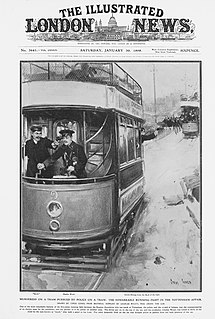The George Cross (GC) is the highest award bestowed by the British government for non-operational gallantry or gallantry not in the presence of an enemy. In the British honours system, the George Cross, since its introduction in 1940, has been equal in stature to the Victoria Cross, the highest military gallantry award. It is awarded "for acts of the greatest heroism or for most conspicuous courage in circumstance of extreme danger", not in the presence of the enemy, to members of the British armed forces and to British civilians. Posthumous awards have been allowed since it was instituted. It was previously awarded to residents of Commonwealth countries, most of which have since established their own honours systems and no longer recommend British honours. It may be awarded to a person of any military rank in any service and to civilians including police, emergency services and merchant seamen. Many of the awards have been personally presented by the British monarch to recipients or, in the case of posthumous awards, to next of kin. The investitures are usually held at Buckingham Palace.

The George Medal (GM), instituted on 24 September 1940 by King George VI, is a decoration of the United Kingdom and Commonwealth, awarded for gallantry "not in the face of the enemy" where the services were not so outstanding as to merit the George Cross.

The Distinguished Conduct Medal was a decoration established in 1854 by Queen Victoria for gallantry in the field by other ranks of the British Army. It is the oldest British award for gallantry and was a second level military decoration, ranking below the Victoria Cross, until its discontinuation in 1993 when it was replaced by the Conspicuous Gallantry Cross. The medal was also awarded to non-commissioned military personnel of other Commonwealth Dominions and Colonies.
The existing Hong Kong honours system was created after transfer of government of Hong Kong to the People's Republic of China as a special administrative region in 1997. Before that, Hong Kong was a British dependent territory and followed the British honours system.
To be mentioned in dispatches describes a member of the armed forces whose name appears in an official report written by a superior officer and sent to the high command, in which their gallant or meritorious action in the face of the enemy is described.

The Military Medal (MM) was a military decoration awarded to personnel of the British Army and other arms of the armed forces, and to personnel of other Commonwealth countries, below commissioned rank, for bravery in battle on land. The award was established in 1916, with retrospective application to 1914, and was awarded to other ranks for "acts of gallantry and devotion to duty under fire". The award was discontinued in 1993, when it was replaced by the Military Cross, which was extended to all ranks, while other Commonwealth nations instituted their own award systems in the post war period.

The Conspicuous Gallantry Medal (CGM) was, until 1993, a British military decoration for gallantry in action for petty officers and seamen of the Royal Navy, including Warrant Officers and other ranks of the Royal Marines. It was formerly awarded to personnel of other Commonwealth countries. In 1943 a Royal Air Force version was created for conspicuous gallantry in action against the enemy in the air.

The British Empire Medal (BEM) is a British and Commonwealth award for meritorious civil or military service worthy of recognition by the Crown. The current honour was created in 1922 to replace the original medal, which had been established in 1917 as part of the Order of the British Empire.

The Queen's Police Medal (QPM) is awarded to police in the United Kingdom for gallantry or distinguished service. It was also formerly awarded within the wider British Empire, including Commonwealth countries, most of which now have their own honours systems. The medal was established on 7 July 1909 as the King's Police Medal (KPM), initially inspired by the need to recognise the gallantry of the police officers involved in the Tottenham Outrage. Renamed the King's Police and Fire Services Medal (KPFSM) in 1940, it was replaced on 19 May 1954 by the Queen's Police Medal (QPM), when a separate Queen's Fire Service Medal was also instituted.

The Queen's Gallantry Medal (QGM) is a United Kingdom decoration awarded for exemplary acts of bravery by civilians, and by members of the Armed Forces "not in the face of the enemy", where the services were not so outstanding as to merit the George Cross or the George Medal, but above the level required for the Queen's Commendation for Bravery.
The Fijian honours system dates from the granting of Dominion status in 1970, when the Fijian Independence Medal was awarded to participants in the Fijian independence celebrations. Prior to two military coups, which deposed Elizabeth II as Queen of Fiji, ending the monarchy of Fiji, Fiji also had use of the British Honours System.
The South African honours system consists of orders, decorations, and medals which are conferred on citizens, and others, to recognise a range of services and achievements. The system has developed since 1894.
The Queen's Fire Service Medal, introduced in 1954, is awarded to members of the fire services in the United Kingdom for distinguished service or gallantry. It was also formerly awarded by Commonwealth countries, most of which now have their own honours systems.

The Queen's Commendation for Brave Conduct, formerly the King's Commendation for Brave Conduct, acknowledged brave acts by both civilians and members of the armed services in both war and peace, for gallantry not in the presence of an enemy. Established by King George VI in 1939, the award was discontinued in 1994 on the institution of the Queen's Commendation for Bravery.

The Tottenham Outrage of 23 January 1909 was an armed robbery in Tottenham, North London, that resulted in a two-hour chase between the police and armed criminals over a distance of six miles (10 km), with an estimated 400 rounds of ammunition fired by the thieves. The robbery, of workers' wages from the Schnurmann rubber factory, was carried out by Paul Helfeld and Jacob Lepidus, Jewish Latvian immigrants. Of the twenty-three casualties, two were fatal and several others serious, among them seven policemen. The two thieves committed suicide at the end of the pursuit.
The history of the Metropolitan Police in London is long and complex, with many different events taking place between its inception in 1829 to the present day.
The Order of Wearing of Australian honours includes Imperial honours if they were awarded prior to 6 October 1992. Imperial honours awarded after 5 October 1992 are considered foreign.

The Union of South Africa King's Medal for Bravery, Silver is the lesser of two classes of a South African civil decoration for acts of bravery that was in use from 1939 to 1952, when the country was a constitutional monarchy in the British Commonwealth. The medal was instituted by King George VI on 23 June 1939.
Keith David Palmer, was a British police officer who was posthumously awarded the George Medal, the second highest award for gallantry "not in the face of the enemy". Though unarmed, he stopped a knife-wielding terrorist from entering the Palace of Westminster during the 2017 Westminster attack; he died from wounds he received in this attack. He had worked for the Metropolitan Police Service (MPS) for 16 years, and had joined the MPS's Parliamentary and Diplomatic Protection Group in April 2016.









